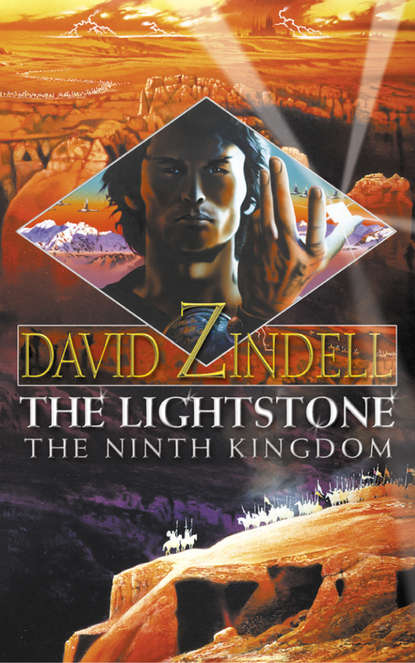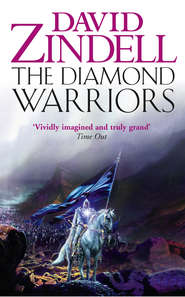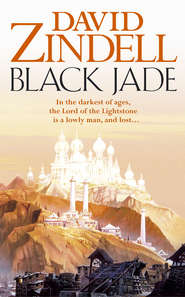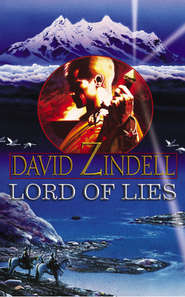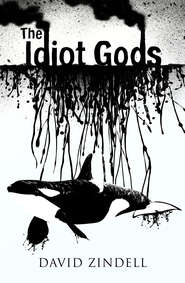По всем вопросам обращайтесь на: info@litportal.ru
(©) 2003-2024.
✖
The Lightstone: The Ninth Kingdom: Part One
Автор
Год написания книги
2019
Настройки чтения
Размер шрифта
Высота строк
Поля
The next day we awoke early to the birds singing their morning songs. We traveled hard through the rolling hill country which gradually opened out into the broad valley of the Tushur. There, the road curved east through the emerald farmland toward the golden glow of the sun – and toward Loviisa, where King Hadaru held his court. We debated making a cut across this curve and rejoining the road much to the north of the Ishkans’ main city. It seemed wise to avoid the bellicose Salmelu and his friends, as Maram pointed out.
‘What if Salmelu,’ he asked me, ‘hired the assassin who shot at us in the woods?’
‘No, he couldn’t have,’ I said. ‘No Valari would ever dishonor himself so.’
‘But what if the Red Dragon has gotten to him, too? What if he’s been made a ghul?’
I looked off at the gleaming ribbon of the Tushur where it flowed through the valley below us. I wondered for the hundredth time why Morjin might be hunting me.
‘Salmelu,’ I said, ‘is no ghul. If he hates me, it’s of his own will and not the Red Dragon’s.’
‘If he hates you,’ Maram said, ‘shouldn’t we avoid him altogether?’
I smiled grimly and shook my head. I told him, ‘The world is full of hate, and there’s no avoiding it. In front of his own countrymen, Salmelu has promised us safe passage, and he’ll have to keep his word.’
After stopping for a quick meal, we decided that making a straight cut through the farms and forests of Ishka would only delay us and pose its own dangers: there would be the raging waters of the Tushur to cross and perhaps bears in the woods. In the end, it was the prospect of encountering another bear that persuaded Maram that we should ride on to Loviisa, and so we did.
We planned, however, to spend the night in one of Loviisa’s inns; the following morning we would set out as early and with as little fanfare as possible. But others had made other plans for us. It seemed that our passage through Ishka had not gone unnoticed. As night approached and we rode past the farms near the outskirts of the city, a squadron of knights came thundering up the road to greet us. Their leader was Lord Nadhru, whom I recognized by the long scar on his jaw and his dark, volatile eyes. He bowed his head toward me and told me, ‘So, Sar Valashu, we meet again. King Hadaru has sent me to request your presence in his hall tonight.’
At this news, I traded quick looks with both Maram and Master Juwain. There was no need to say anything; when a king ‘requested’ one’s presence, there was nothing else to do except oblige him.
And so we followed Lord Nadhru and his knights through Loviisa, whose winding streets and coal-fired smithies reminded me of Godhra. He led us past a succession of square, stone houses up a steep hill at the north of the city. And there, on a heavily wooded palisade overlooking the icy, blue Tushur, we found King Hadaru’s palace all lit up as if in anticipation of guests. As Ludar Narath had told me, the King disdained living in his family’s ancient castle in the hills nearby. And so instead he had built a palace fronted with flower gardens and fountains. The palace itself was an array of pagodas, exquisitely carved on its several levels out of curving sweeps of various kinds of wood. Indeed, it was famed throughout the Morning Mountains as the Wooden Palace. Ludar himself had cut dozens of rare shatterwood trees to provide the paneling of the main hall. Inside this beautiful building, if the stories proved true, we would find beams of good Anjo cherrywood and ebony columns that had come all the way from the southern forests of Galda. It was said that King Hadaru had paid for his magnificent palace with diamonds from the overworked Ishkan mines, but I did not want to believe such a slander.
We entrusted our horses to the grooms who met us at the entrance to the palace. Then Lord Nadhru led us down a long corridor to the hall where King Hadaru held his court. The four warriors guarding the entrance to this great room asked us to remove our boots before proceeding within, and so we did. They allowed me, of course, to keep my sword sheathed by my side. One might better ask a Valari knight to surrender his soul before his sword.
The Ishkan nobles, Salmelu and Lord Issur foremost among them, stood waiting to welcome us near King Hadaru’s throne. This was a single piece of white oak carved into the shape of a huge bear squatting on its hind legs. King Hadaru seemed almost lost against this massive sculpture, and he was no small man. He sat very straight in the bear’s lap, back against the belly and chest, with the great white head projecting up and out above him. He himself seemed somewhat bearlike, with a large head covered by a mane of snowy white hair that showed ten red ribbons. He had a large, predatory nose like Salmelu’s and eyes all gleaming and black like polished shatterwood. As we walked through the hall, with its massive oak beams arching high above us, his dark eyes never left us.
After Lord Nadhru had presented us, he took his place near Salmelu and Lord Issur, who stood near their father’s throne. Other prominent knights attended the King as well: Lord Mestivan and Lord Solhtar, a proud-seeming man with a heavy black beard that was rare among the Valari. Two of the women present that night were Devora, the King’s sister, and Irisha, a beautiful young woman who seemed about my age. Her hair was raven-black and her skin almost as fair as the oak of King Hadaru’s throne. She was the daughter of Duke Barwan of Adar in Anjo, and it was said that King Hadaru had coerced him into giving her as his bride after his old queen had died. She stood in a bright green gown close to the King’s throne, closer even than Salmelu. It was somewhat barbaric, I thought, that even a queen should be made to stand in the King’s presence, but that was the way of things in Ishka.
‘Sar Valashu Elahad,’ the King said to me in a voice thickened with the bitterness of age. ‘I would like to welcome you to my home.’
He nodded at Maram and Master Juwain, who stood on either side of me, and continued, ‘And you, Prince Maram Marshayk of Delu and Master Juwain of the Great White Brotherhood – you are welcomed, too.’
We thanked him for his hospitality, and then he favored me with a smile as brittle as the glass of the many windows of the hall. He told me, ‘I hope you like your accommodations here better than those of that draughty old castle of yours.’
In truth, I already liked the palace of this sad, old king more than my father’s castle, for it was a splendid thing. The vast roof of the hall, supported by great ebony columns, opened out in sweeping curves high above us like an indoor sky made of some sort of bluish wood. The panels of the walls were of the blackest shatterwood and red cherry, carved with battle scenes of Ishka’s greatest victories. The darkness of these woods would have cast a gloom upon the hall if they hadn’t been waxed and polished to a mirrorlike finish. In their gleaming surfaces was reflected the light of the thousands of candles burning in their stands. As well, I saw thousands of leaping red flames in the deep gloss of the floor, which was of oak unadorned by any carpet. Its grainy whiteness was broken only by a circle some twenty feet across in front of the throne; no one stood upon this disk of red rosewood that must have been cut in Hesperu or Surrapam. I guessed that it symbolized the sun or perhaps one of the stars from which the Valari had come. I couldn’t see a speck of dust upon it, nor on any other surface in the hall, which smelled of lemon oil and other exotic polishes.
‘My cooks are preparing a meal, which we’ll take in the dining room,’ King Hadaru said to me. ‘Now, I would like to know if there is anything you need?’
Maram, I noticed, was concentrating his attention on Irisha with a barely contained heat. I nudged him in the ribs with my elbow, and said to the King, ‘We need only to travel as quickly as possible at first light.’
‘Yes,’ King Hadaru said, ‘I’ve heard that you’ve pledged yourself to making this foolish quest.’
‘That’s true,’ I said, feeling the eyes of everyone near the throne fall upon me.
‘Well, the Lightstone will never be found. Your ancestor gave it to a stranger in Tria when he would have done better to bring it to Loviisa.’
His thin lips pulled together in distaste as if he had eaten a lemon. I could almost feel the resentment burning inside him. It occurred to me then that love frustrated turns to hate; hope defeated becomes the bitterness of despair.
‘But what if the Lightstone were found?’ I asked him.
‘By you?’
‘Yes – why not?’
‘Then I have no doubt that you would bring it back to your castle and lock it away from the world.’
‘No, that would never happen,’ I told him. ‘The Lightstone’s radiance was meant to be shared by everyone. How else could we ever bring peace to the world?’
‘Peace?’ he snarled out. ‘How can there ever be peace when there are those who would claim what is not theirs?’
At this, Salmelu traded sharp looks with Lord Nadhru, and I heard Lord Solhtar murmuring something about Korukel’s diamonds. Lord Mestivan, standing next to him in a bright blue tunic, nodded his head as he touched the red and white battle ribbons tied to his long black hair.
‘Perhaps someday,’ I said, ‘all will know what is rightfully theirs.’
At this, King Hadaru let out a harsh laugh like the growl of a bear. And then he told me, ‘You, Valashu Elahad, are a dreamer – like your grandfather.’
‘Perhaps that’s true,’ I said. ‘But all men have dreams. What is yours, King Hadaru?’
This question caught the King off guard, and his whole body tensed as if in anticipation of a blow. His eyes deepened with a faraway look; he seemed to be gazing through the beautiful woods of his palace out into the nighttime sky. He suffered, I thought, from a stinginess of spirit in place of austerity, a brittle hardness instead of true strength. He strove for a zealous cleanliness when he should have longed for purity. If it came to war, he would fight out of pride of possessiveness rather than the protecting of that which he cherished most. And yet despite these turnings of the Valari virtues, I also sensed in him a secret desire that both he and the world could be different. He might fight against Waas or Mesh with all the cool ferocity for which he was famed, but his greatest battle would always be with himself.
‘Of what do I dream?’ he murmured as he pulled at the ribbons tied to his hair. His eyes seemed to grow brighter as they turned back toward me. ‘I dream of diamonds,’ he finally told me. ‘I dream of the warriors of Ishka shining like ten thousand perfect, polished diamonds as they stand ready to fight for the riches they were born for.’
Now it was my turn to be caught off guard. My grandfather had always said that we were born to stand in the light of the One and feel its radiance growing ever brighter within ourselves, and I had always believed that he had told me the truth.
King Hadaru glanced at Lord Nadhru and asked, ‘And of what do you dream, Lord Nadhru?’
Lord Nadhru fingered the hilt of his sword, and without hesitation, said, ‘Justice, Sire.’
‘And you, Lord Solhtar?’ the King said to the man next to him.
Lord Solhtar fingered his thick beard for a moment before turning to look at the woman on his left. She had the thick bones and brown skin of a Galdan, and I wondered if she had come from that conquered kingdom. Lord Solhtar smiled at her in silent understanding, and then said, ‘I dream that someday we Ishkans may help all peoples regain what is rightfully theirs.’
‘Very good,’ Lord Issur suddenly said. Although he was Salmelu’s brother, he seemed to have little of his pugnaciousness and none of his arrogance. ‘That is a worthy dream.’
King Hadaru must have caught a flash of concern from his young wife, for he suddenly looked at Irisha and said, ‘Do you agree?’
I noticed Maram staring at Irisha intently as she brushed back her long hair and said, ‘Of course it is worthy – worthy of our noblest efforts. But shouldn’t we first look to the safeguarding of our own kingdom?’
This ‘safeguarding,’ I thought, might well mean the eventual incorporation of Anjo into Ishka. Although Irisha’s father might owe allegiance to Anjo’s King Danashu in Sauvo, Danashu was a king in name only. And so Adar, much to Duke Barwan’s shame, had practically become a client state of Ishka. In truth, the only thing that kept Ishka from biting off pieces of Anjo one by one like a hungry bear was fear of Meshian steel.
For a while I listened as these proud nobles talked among themselves. They seemed little different, in their sentiments and concerns, from the lords and knights of Mesh. And yet the Ishkans were different from us in other ways. They wore colors in their clothing and battle ribbons in their hair in a time of peace, something that my dour countrymen would never do. And some of them, at least, had taken foreign-born wives. But worst of all, I thought, was their habit of frequently using the pronoun ‘I’ in their speech, which sounded vulgar and self-glorifying.
I remembered well my father telling me about the perils of using this deceptive word. And wasn’t he right, after all? It is vain. It is a distracting mirror. It shrinks the soul and traps it inside a box of conceits, superficialities and illusions. It keeps us from looking out into the universe and sensing our greater being in the vastness of the infinite and the fiery exhalations of the stars. In Mesh, one used the word in forgetfulness or almost as a curse – or, rarely, in moments of great emotion as when a man might whisper to his wife in the privacy of their house, ‘I love you.’
As it grew closer to the hour appointed for dinner, King Hadaru listened patiently to all that everyone had to say. Then finally, with a heaviness both in his body and spirit, he looked at Salmelu and asked, ‘Of what do you dream, my son?’
Salmelu seemed to have been waiting for this moment. His eyes flared like a fire stoked with fresh coal as he looked at me and said, ‘I dream of war. Isn’t that what a Valari is born for? To stand with his brothers on the battlefield and feel his heart beating as one with theirs, to see his enemies crumble and fall before him – is there anything better than this? How else can a warrior test himself? How else can he know if he is diamond inside or only glass that can be broken and ground beneath another man’s boot, to blow away like dust in the wind?’





